|
|
|
Sort Order |
|
|
|
Items / Page
|
|
|
|
|
|
|
| Srl | Item |
| 1 |
ID:
148242
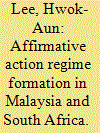

|
|
|
|
|
| Summary/Abstract |
This paper examines the formation of majority-favouring affirmative action (AA) regimes in Malaysia and South Africa. Malaysia’s Constitution premises AA on a group’s special position; South Africa’s refers to unfair discrimination. Malaysia established AA amid continuation of a political order and consolidation of executive power, while South Africa democratized and transitioned from minority to majority rule. Minority groups held less economic power in Malaysia than in South Africa. Consequently, AA in Malaysia is characterized by discretionary decision-making, and quota-based, centralized programmes, whereas South Africa has followed a legislative route involving negotiation and enforcement of target-based, statutory requirements, under less centralized oversight.
|
|
|
|
|
|
|
|
|
|
|
|
|
|
|
|
| 2 |
ID:
148247
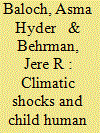

|
|
|
|
|
| Summary/Abstract |
We examine the impact of four different climatic shocks as perceived by households and community representatives on child learning and health outcomes in Ethiopia; one of the poorest countries in Sub-Saharan Africa. Two waves of household panel data for the years 2006 and 2009 are used and data is collected from both urban and rural areas of Ethiopia. For child learning outcomes we use enrollment, Peabody picture vocabulary and math test scores and for health outcomes we use body mass index z-scores and height for age z-scores.
|
|
|
|
|
|
|
|
|
|
|
|
|
|
|
|
| 3 |
ID:
148248


|
|
|
|
|
| Summary/Abstract |
This study examines the contextual beliefs held by interactants in the 2008 quasi-judicial public hearing on the Federal Capital Territory (FCT), Abuja Administration in Nigeria, using Odebunmi’s (2006) model of context. The data for the study includes forty video recordings of the 2008 quasi-judicial public hearing on the Federal Capital Territory, Abuja Administration in Nigeria. The findings indicate that the shared contextual beliefs in the public hearing are based on shared knowledge of the public hearing aims and procedure, legal codes regarding landed property, government involvement and knowledge of Abuja metropolis.
|
|
|
|
|
|
|
|
|
|
|
|
|
|
|
|
| 4 |
ID:
148244
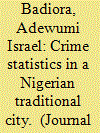

|
|
|
|
|
| Summary/Abstract |
The study identified predominant crime type and pattern of crime occurrence in Ile-Ife, Nigeria. The research used crime data, by type and location, from January 2005 to December 2010. The spatial distribution of crime types revealed that 68 cases (49%) of offences against individuals occurred in the core area of the city, 40 (29%) in the transition area and 31 (22%) in the suburban, while 184 (20%), 265 (30%) and 451 cases (50%) of offences against property occurred in the core, transition and suburban respectively. The study concluded that there was notable geographical variation in the pattern of crime locations and that this differs with regard to crime type.
|
|
|
|
|
|
|
|
|
|
|
|
|
|
|
|
| 5 |
ID:
148243


|
|
|
|
|
| Summary/Abstract |
This paper examines the effects of truth and reconciliation commissions and peace committees on popular perceptions of the judicial systems of Africa. Using data from the Afrobarometer, and conducting mixed effects quantitative analysis, we test whether or not the use of truth and reconciliation commissions (TRCs) and peace committees led to greater popular trust in the courts. We find both cross-nationally, sub-nationally, and over time, the use of TRCs has not led to greater trust in courts (as is often claimed by its advocates), but find some support for the notion that they detract from trust in the judiciary. We suggest this is because such institutions have been established to compete with existing judicial practices, rather than complement and enhance them.
|
|
|
|
|
|
|
|
|
|
|
|
|
|
|
|
| 6 |
ID:
148245
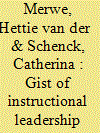

|
|
|
|
|
| Summary/Abstract |
A growing body of scholarship links instructional leadership to effective teaching and learning. This article looks at the ‘what’ of instructional leadership as practised in Swaziland primary schools. A qualitative investigation was undertaken based on individual and focus group interviews conducted at eight primary schools in the Hhohho region of Swaziland. The findings show that demonstrative leadership accompanied by collaborative support and recognition for achievement are important features of an effective instructional leadership programme. The main limitations to optimal learning are the collection of school fees during school hours and balancing English as the language of instruction with preserving the indigenous language. The findings emphasize the importance of mutual effort as the main component of effective teaching and learning.
|
|
|
|
|
|
|
|
|
|
|
|
|
|
|
|
| 7 |
ID:
148246
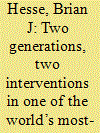

|
|
|
|
|
| Summary/Abstract |
In 1992, more than 25,000 United States forces landed in Somalia as part of a 37,000-strong United Nations Task Force (UNITAF) operation. In 2011, a combined total of 8000+ Kenyan and Ethiopian forces were ordered into Somalia. This article demonstrates that American soldiers were deployed to Somalia in the early days of a post-Cold War world, largely as a foreign policy experiment about how to deal with the threats ‘small states’ posed in a new world order. It is maintained that Kenyan and Ethiopian soldiers were deployed to Somalia to deal with some of the very threats American foreign policymakers had identified almost two decades earlier, from refugees to terrorism. To conclude, the article uses public goods theory to contend that military interventions that are ostensibly peacekeeping in nature can be inherently inadequate because ‘self-interest works against the interests of the collective’ (Bobrow and Boyer, 1997: 726). Accordingly, America’s intervention in Somalia between 1992 and 1994 failed to remedy adequately the circumstances and concerns which spawned the perceived need for Kenyan and Ethiopian forces to intervene in Somalia a generation later, in 2011. Unfortunately for Kenyan and Ethiopian soldiers, Somalia’s politicians and political processes might relegate them to realizing little more success than their American predecessors.
|
|
|
|
|
|
|
|
|
|
|
|
|
|
|
|
|
|
|
|
|